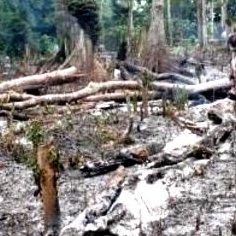 D.R. CONGO, AFRICA - A new move to stop African farmers from burning down forests to plant crops is being launched with a $21.5 million grant from the Climate Investment Funds in the Democratic Republic of Congo.
D.R. CONGO, AFRICA - A new move to stop African farmers from burning down forests to plant crops is being launched with a $21.5 million grant from the Climate Investment Funds in the Democratic Republic of Congo.
"The traditional method of farming in the region involves the cutting and burning of trees and other vegetation to clear plots for the growing of crops," according to the Okapi Conservation Project, a non-profit addressing the problem in the Congo. "After several plantings, the topsoil is depleted and the farmer moves deeper into the forest and repeats the process. Fields are nutritionally exhausted after two years of agricultural use and may take 15 years to recover. Instead of waiting on the fields to recover, farmers cut down more rainforests to grow more crops."
The pilot program, which is also being implemented in two West African nations, Ghana and Burkina, is expected to sector to reduce greenhouse gas emissions and strengthen forest governance.
The Integrated REDD+ Project in the Mbuji-Mayi/Kananga and Kisangani Basins (PIREDD/MBKISS) will carry out a series of pilot initiatives to help reduce forest GHG emissions and poverty in large swaths of degraded savannah and closed forest areas.T
The five-year Congo program, totalling $26.6 million with a Congo Government contribution of $4.4 million, and contributions of $700,000 million by project beneficiaries, will be implemented with support from the African Development Bank, a mainstay for climate and development in Africa.
“This FIP grant is the first ever awarded by CIF to an African nation for forest action, and stands as a significant infusion of support for climate action and sustainability in some of the world's most critical forests,” stated Mafalda Duarte, AfDB's CIF coordinator and its chief climate change specialist.
The Congo project will save 4 million tonnes of CO² over 25 years. An estimated 400,000 people will receive direct benefits, and an additional 1.5 million inhabitants are expected to indirectly benefit from the work.






Have something to say? Share your thoughts with us in the comments below.